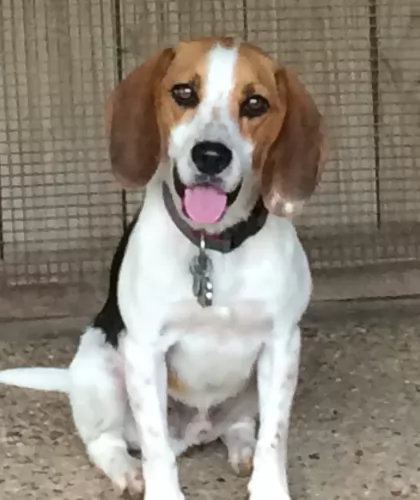 Petzlover
Petzlover Beagle is originated from United Kingdom but Dachshund is originated from Germany. Beagle may grow 13 cm / 6 inches higher than Dachshund. Both Beagle and Dachshund are having almost same weight. Both Beagle and Dachshund has almost same life span. Beagle may have more litter size than Dachshund. Both Beagle and Dachshund requires Low Maintenance.
Beagle is originated from United Kingdom but Dachshund is originated from Germany. Beagle may grow 13 cm / 6 inches higher than Dachshund. Both Beagle and Dachshund are having almost same weight. Both Beagle and Dachshund has almost same life span. Beagle may have more litter size than Dachshund. Both Beagle and Dachshund requires Low Maintenance.
 There are some accounts of similar size dogs used for hunting in Greece in 5th century BCE. During 8th century the Talbot Hound breed was created. In 11th century Talbot Hound was brought to England by William the Conqueror. While using in hunting they are found to be a slow runner. To overcome the situation and increase their running speed the hunting people bred Talbot Hound with Grey hounds. The beagles described earlier were very small in size and are said as pocket beagles.
There are some accounts of similar size dogs used for hunting in Greece in 5th century BCE. During 8th century the Talbot Hound breed was created. In 11th century Talbot Hound was brought to England by William the Conqueror. While using in hunting they are found to be a slow runner. To overcome the situation and increase their running speed the hunting people bred Talbot Hound with Grey hounds. The beagles described earlier were very small in size and are said as pocket beagles.
 The Dachshund originated in Germany. He was used as a hunting dog with his origins starting way back in the 15th century already. The small dog was developed to hunt for animals that buried themselves deep underground such as badgers. The shape of the dog and his courage and bravery allowed him to take on the badger.
The Dachshund originated in Germany. He was used as a hunting dog with his origins starting way back in the 15th century already. The small dog was developed to hunt for animals that buried themselves deep underground such as badgers. The shape of the dog and his courage and bravery allowed him to take on the badger.
There has been a lot of debate as to whether the Dachshund is a hound or terrier, and it was decided that the Dachshund is a hound that became a terrier, and which displays some of the best qualities of both.
It was in 1881 that the Dachshund Club of England was formed and the German Deutscher Teckelklub was formed in 1888. The small dog gained popularity in America and the Dachshund Club of America was founded in 1895.
 They are small and compact breed, and always happy and fun loving. They should be trained by patient and creative training techniques. Beagles are very much interested in using their nose in finding interesting scents and are food focussed. They always wake their neighbours at 6 am by their half howling. They think everyone is their best friend and love to have friendship with other animals and humans. They have about 220 million scent receptors and are said as "a nose with feet" by humorist Dave Barry.
They are small and compact breed, and always happy and fun loving. They should be trained by patient and creative training techniques. Beagles are very much interested in using their nose in finding interesting scents and are food focussed. They always wake their neighbours at 6 am by their half howling. They think everyone is their best friend and love to have friendship with other animals and humans. They have about 220 million scent receptors and are said as "a nose with feet" by humorist Dave Barry.
We can see beagles at many airports in their duty. They can easily trace out the illegal things being smuggled. Since they are small in size they are suitable for apartment living. But they like to walk around several times. They should be exercised for plenty of time. Obedience training should be given to them by giving food reward. Beagles are wanderers of nature and so if possible they will try to escape. So it is necessary to make them microchipped or to wear a collar, to find them easily.
 Known as Badger Dogs, Sausage Dogs or Doxies, the Dachshund is known for his long body, his sharp, pointed face and the short legs with the large front paws.
Known as Badger Dogs, Sausage Dogs or Doxies, the Dachshund is known for his long body, his sharp, pointed face and the short legs with the large front paws.
He stands at about 21-28 cm while the female may be 20-25 cm and weighing 6 to 15kg. He is the smallest of the hound dogs, with the standard size dachshund being developed to scent and chase badgers and other animals.
There are different Dachshund coat varieties – the smooth coat, the long-haired Dachshund and the wire-haired dachshund. They also come in a number of solid colors such as brown, red, tan, chocolate and black.
The dachshund is an energetic,social little dog with a loving personality. He’ll love to lie as close as possible to you on the couch and be with you wherever you are. Training and socialization is important so he doesn’t become too protective so that he wants to go for anyone who comes near.
He can be stubborn but he is also protective of his human family. Dachshunds are known for their tendency to bark but training and socialization can help tremendously to make him obedient and relaxed around humans and pets.
He is small enough to be a great pet in the city or in the country. He loves to spend time indoors- as well as outdoors. He can become a loving companion and gets on well with children and pets in the house. In spite of his small size, he makes a good watchdog.
 They are very good companion for children. They love to play and spend time with children.
They are very good companion for children. They love to play and spend time with children.
They have millions of scent receptors and so they can be seen in Airports and many important places in duty. Also they are interested in hunting small rodents.
They adapt well for apartment living but they don't like being alone for a long time. If kept alone for a long time in back yard they will begin to bark and dig pit or try to escape. Beagle likes hot weather more than cold weather.
Beagles are difficult to train up. Many people say it will take about one year to house train beagles. They have an attitude of "what's in it for me". But it depends on the personality and temperament of the individual.
 The Dachshund may be small but he is courageous, brave and loyal. He gets on well with children and pets in the home but care needs to be taken because of his long back.These dogs are prone to disk problems so you have to be careful with rough and tumble from children.
The Dachshund may be small but he is courageous, brave and loyal. He gets on well with children and pets in the home but care needs to be taken because of his long back.These dogs are prone to disk problems so you have to be careful with rough and tumble from children.
Dog experts say that the different kinds of Dachshunds produce different personalities and that the longer-coated one is more amicable than the short-coat variety. Whichever variety you choose, they are guaranteed to entertain and delight you and be a loyal, loving companion.
 Beagle's ears should be checked occasionally for any sign of infections like discoloured wax, dirt or foul odour. Also their nails should be trimmed regularly. They should be exercised regularly in order to maintain a proper weight. The most common health problems in beagles are obesity, epilepsy and allergies.
Beagle's ears should be checked occasionally for any sign of infections like discoloured wax, dirt or foul odour. Also their nails should be trimmed regularly. They should be exercised regularly in order to maintain a proper weight. The most common health problems in beagles are obesity, epilepsy and allergies.
They are average shedders and having short hair thus it is easy to groom. They should be made to bath with a mild and non irritant shampoo.
 The life expectancy of the Dachshund is 12 to 16 years. With good care which includes good nutrition he can reach mature years. However there are always some dog diseases that are worth knowing about so that you can steer your pet away from them.
The life expectancy of the Dachshund is 12 to 16 years. With good care which includes good nutrition he can reach mature years. However there are always some dog diseases that are worth knowing about so that you can steer your pet away from them.
One of these is obesity, and the Dachshund is prone to developing obesity. Never overfeed him and ensure he gets his regular exercise which can be walks and ball games. Check with your vet if you’re unsure about how to feed him. Essentially, the amount of food you give a dog depends on the size of your dog, his age and his activity levels.
Be sure to provide high-quality food and monitor his intake. Your vet is always there to advise on the correct food and amount that can help him remain healthy.
Unfortunately, this dog’s shape – the long back – makes the dog more prone to disc herniation. With some Dachshunds having a gene that creates mineral deposits in the discs in the spine, the risk of herniation is higher.
A large percentage of dachshunds have intervertebral disc disease. Encourage your Dachshund not to jump down off a bed or couch, but rather provide some steps for him to get to out of reach places.
 After 4 weeks of birth the puppy can be given solid foods by slowly increasing the ratio for many weeks. The recommended food is fresh meat of chicken breast, lamb, turkey and lean hamburger. The vegetables can be given as raw or steamed. The vegetables that will be good for them are raw baby carrots, broccoli, cauliflower and sweet peas. The puppies should be fed 3 to 4 small meals per day as they require more nutrients for their growth.
After 4 weeks of birth the puppy can be given solid foods by slowly increasing the ratio for many weeks. The recommended food is fresh meat of chicken breast, lamb, turkey and lean hamburger. The vegetables can be given as raw or steamed. The vegetables that will be good for them are raw baby carrots, broccoli, cauliflower and sweet peas. The puppies should be fed 3 to 4 small meals per day as they require more nutrients for their growth.
The grown up dog should be fed with the same food and 1 complete meal is enough for them. The meal should be given at noon. The food should be given based on calories as they should not get overweight. In addition to food, fruits such as blueberries, raspberries, banana and mango can also be given to them periodically.
Beagles should be exercised daily in order to maintain proper weight. Beagles are average shedders and having short hair which is easy to groom. They should be made to bath periodically with a mild shampoo.
Moderate exercise such as walking and cardio exercise such as chasing a ball should be given to them for staying them to be active and for maintaining good health.
 The Dachshund is a medium shedder and if you choose the short haired dog, you’re going to have a low maintenance pet.
The Dachshund is a medium shedder and if you choose the short haired dog, you’re going to have a low maintenance pet.
The long haired Dachshund will require more regular brushing but the short-haired Dachshund is a low maintenance dog that will require a brush once a week.
While brushing him, you can be checking his ears and nails at the same time. All dogs with floppy ears need to have them checked for ear infections. Also, maintain good oral hygiene with your Dachshund by brushing his teeth 2 or 3 times a week.